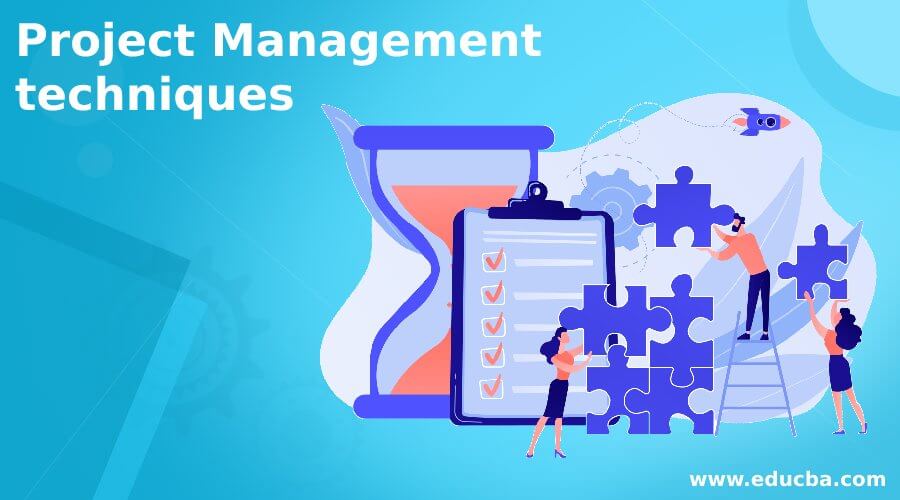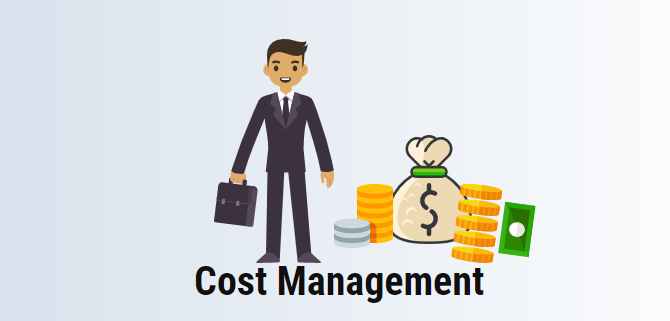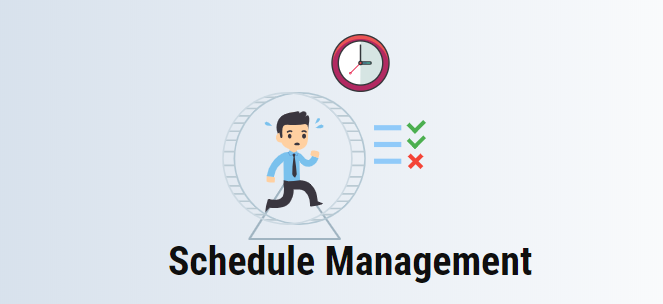Updated June 12, 2023
Introduction to Project Management Techniques
Aspiring to be a Project Manager? Or aspiring to be a better Project Manager? Why not jump for the best? At every mile in your career, it’s important that you check on your project management techniques and knowledge level and make efforts to become better than what you are right now. Getting on with an opportunity at a project needs you to be able to handle one. You need to polish your project management techniques at all times. Through these project management skills will be able to lead the project efficiently and effectively and have a successful project at hand. Projects come in all shapes and pose different issues, problems, and conditions to work on. Project managers professionally handle the increased complexity of a widened project scope through their expertise and impeccable project management techniques.
Utilizing the best project management skills and effective leadership in minimizing obstacles throughout the project are key factors that assess the expertise and caliber of a project manager. The Project Management Techniques article will evaluate 8 key areas of expertise necessary for an efficient project manager. Take this quiz to self-assess your project management techniques and identify areas for improvement to excel in your role!
Let’s Test the Waters (Project Management techniques)
You are presented with 20 questions to evaluate yourself on project management techniques required in the industry. It is recommended to carefully read the questions before attempting to answer them orally or on paper. Take a deep breath and go for it!
Note: This is not a competitive test but a self-awareness test to gauge your level of project management techniques.
Project Integration(Project Management techniques)
- Q1. At the start of a project, do you officially outline the what, why, who, how, and when and document these details within the Project Charter and Project Plan?
- Q2. As a project manager, do you prefer to go with the flow or maintain flexibility when planning for the inevitable complexities and variables that projects often entail?
What you need to do: To ensure everyone on the project understands the functions of the different project elements, you should inform the project team members about the various elements collaborating to achieve the big picture.
The project manager should ensure that the project goal or objective, the problem to be resolved, or the change to be implemented aligns with the company’s goals and is carefully integrated into the project. All project elements should work together to achieve the objective, ensuring alignment with organizational goals.
A comprehensive Project Charter and Project Management Plan should encompass the project manager’s idea of how the project would successfully attain its intended goal. These documents would contain the basic needs of the project as well as the roles and responsibilities played and conducted by the various project stakeholders and members, making it much easier to deal with varied situations. This can be a perfect platform to showcase your project management skills.
In order to prepare such documents, check out articles on Project Charters and Project Management Plans.
Quality Management -(Project Management techniques)
- Q3. Do you only focus on delivering specifications on time and a budget? Are these aspects of the project the most important for you as a project manager?
- Q4. Do you utilize the requirements stated by customers/stakeholders as quality measures benchmarked throughout the project?
What you need to do: Quality is the major output looked after and sought after by customers and stakeholders. A quality product speaks a lot about the process and stages it has undergone to get the desired results. The triple constraints (time, cost, scope) determine output quality and brand value. Your project management skills in quality management play a crucial role here and can immensely contribute to your project.
As a project manager, it is crucial to understand that quality is key to ensuring customer satisfaction and stakeholder trust. Discussing specifications and needs with project sponsors is essential, especially when constraints exist. Market and consumer research before the project start is vital for quality and meeting customer expectations. Negotiating and understanding the required quality from the consumer’s perspective is important to ensure project success.
Scope Management – (Project Management techniques)
- Q5. At the start of a project, do you meticulously work with project sponsors to negotiate and agree to specific deliverables to be carried out during the course of the project?
- Q6. Do you specifically define and jot down the needs and expectations that the stakeholders have from the project and carefully analyze and use these expectations to manage the project’s scope?
What you need to do: As a project manager, it is essential to envision and understand the expectations and requirements of project stakeholders and customers. This knowledge should be carefully studied and analyzed before preparing a scope definition, as it helps define and maintain the project’s scope to prevent scope creep. Clearly defining the project’s boundaries and restricted areas is crucial, and this should be documented in the project management plan with the support of project sponsors.
It is the project manager’s responsibility to keep the project within its defined scope throughout its duration to avoid impacts on deadlines, budget, and resources.
Team Management(Project Management techniques)
- Q7. Do you prefer spending your time in a meeting room developing ideas instead of explaining those ideas to other people in a conference room?
- Q8. Do you believe monitoring people after they have promised to do a task for you is necessary?
- Q9. Do you believe people should be self-motivated to perform their jobs, or do you think you have a role in influencing their level of motivation?
What you need to do: Building and fostering a collaborative team that works together towards a common goal is crucial as a project manager. Teamwork is a fundamental project management technique that enables the best possible outcomes. Despite differences in roles and functions within the organization, creating a cohesive team is essential for project success. “Teamwork makes the dream work” is a quote that holds true and has been a key factor in the success of many projects.
Making team members responsible and committed towards a goal can bring out varied ideas and inspirations to tag on. This activity will greatly boost the project’s success and elevate the quality of thinking by a magnitude of a million.
While a team is never a dream team or sheer perfection, it is surely one that sits on trust. While each team member is different, a project manager should convey clear instructions to their team members to conduct their given tasks to meet expectations. Good project management techniques would dictate that monitoring should be via a system and not at desks.
Project managers must maintain high team motivation for success. Team activities can be promoted at frequent intervals. This can boost the level of motivation and percolate down to each member as their self-motivation.
People Management
- Q10. Project teams later dissipate once the project achieves completion. So, as a project manager, do you worry about each individual personality within the team? How do you select your team members: based on their technical skills or by influences off-work?
- Q11. Do you manage their individual and collective performance in the project evaluation process?
What you need to do: The team members you collaborate with must be the right mix of good things. With interpersonal and technical skills and striking project management techniques, a project manager needs to be efficient in project management techniques to bring out the best in each team member and not only look at them as a group striving for a goal together.
Helping your team members to achieve heights, in turn, gets you and your project to reach its peak. Keep performance expectations and have well-drafted task allocations made. Keep track of how your team members perform on the set expectations and how you can help raise the bar for them. Constant feedback sessions and aspiration goals need to be discussed with them. This will help them bridge the gap and help you achieve tremendous results for your project.
Cost Management
- Q12. When developing the project’s costing and budget plan, do you consider different cost alternatives?
- Q13. Do you include extra buffers in the budget while forecasting the costs, with the hope of being under the limit set?
What you need to do: Cost planning comes across as the crux of businesses as these will define the revenue and the ROI. Good project management techniques urge project managers to be extremely cautious and alert while chalking out the project’s budget and help them consider all the necessary factors before finalization.
Budgets should be planned systematically and involve accurate estimation, budgeting, and controlling funds. These are very important as decisions are based on the cost factor. How you handle your project’s budget will determine how the business will perform. While performing project costing, you must consider all the variations and alternatives that come your way and include them in the final budget. Adding buffers can be beneficial in some cases but inaccurate in others. This is a pure judgment call and involves experience with their project management techniques. This also requires the project manager to consider the aftermaths of putting up a formidable forecasting number.
Schedule Management
- Q14. Do you frequently communicate the tasks that need to be completed by specific deadlines to your team members, and do you expect them to manage their time and complete the work as expected?
- Q15. When a project falls behind schedule, do you collaborate with your team to implement measures to get back on track or engage in a blame game?
- Q16. Do you establish timelines for your team members’ project tasks and assist them in coordinating effectively with others to fulfill their requirements?
What you need to do: As mentioned above in the Scope Management section, it’s pretty easy for the scope to stretch and the schedule to go off-track. This can be a delay in the project, shifting the schedule tremendously. This can have adverse effects on the costing made on the project and can burn out the resources as well.
Project managers must manage timelines effectively using techniques, accounting for error margins, and identifying opportunities to mitigate delays. Timely communication of timelines and consequences is crucial. Proactively addressing deviations, collaborating with team members, and finding solutions are essential to keep the project on track.
Team members, including executives, may need help with time and schedule management. Project managers are best positioned to assist in planning tasks and chunking activities for timely completion.
Communication Skills
- Q17. As project management techniques dictate, do you keep all project stakeholders updated about the proceedings of the project with regular meetings and appropriate distribution of all performance and status reports and project documents?
- Q18. Do you strive to present project information in an easy-to-use and easy-to-access format for better clarity and transparency?
What you need to do: Communication is THE most important project management process for any project manager. The project management process supports and is interlinked with all the other project management techniques mentioned in the article. Being able to bring clarity to your methods and ways can increase your efficiency as a project manager and can lead you to put your ideas and motives across fluently.
Project stakeholders normally need clarity regarding what is going on with the project and always need presentable data and information. Communicating such information in a clear and concise manner is the need of the hour. Different stakeholders in the project need different levels of communication, and the project manager needs to ensure it stays that way.
Creating project dashboards and utilizing various project management plans and tools and project management techniques can be useful in maintaining a collaborative environment with great communication.
So, how did you score? Which are the project management techniques areas that need polishing? Or, which are the areas completely new to you? Get up and running with your project management techniques and make people turn around to you and go, “Wow! This is the kind of manager I’d like to be!”
Recommended Articles
This has been a guide to project management techniques. Here we have discussed the 20 questions based on project management and what is required by project managers. You may also look at the following project management techniques articles to learn more –



